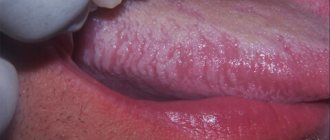Doctors are often contacted with a complaint of a salty or fishy taste in the mouth.
In some cases, this circumstance is not associated with the disease, but nevertheless worsens a person’s quality of life, since appetite decreases and it becomes impossible to enjoy food.
But most often this condition is provoked by various diseases .
Therefore, in any case, if you have a fishy taste in your mouth for no apparent reason, you should see a doctor.
Why does it occur: causes of the symptom?
Stay up to date! If a person did not eat seafood or consume fish oil the day before, then the taste of raw fish in the mouth can be caused by a number of factors, such as:
- Kidney failure.
- Inflammatory process in the salivary glands. Under the influence of bacteria or viruses, inflammation leads to a change in the chemical composition of saliva.
- Insufficient intake of fluid into the body , while dry mouth is added to the fishy taste. As a result of dehydration, a person loses beneficial vitamins and minerals. Often this problem occurs due to improper use of medications - diuretics.
- During cancer treatment, radiation and chemotherapy can affect taste buds. Therefore, the taste of fish or other substances in the mouth is not excluded. In particular, such side effects are caused by the drugs Methotrexate and Vincristine.
- Tears entering the nasopharynx.
- Sinusitis, rhinitis or allergies - mucus can accumulate in the sinuses and oropharynx, which, flowing down the walls of the throat, gives a similar taste.
- Lack of oral hygiene. As a result, soft and hard deposits develop, and they are a favorable environment for the development of infection. Pathogenic bacteria begin to affect the oral mucosa, teeth, and salivary glands, which can also affect taste. If inflammatory processes in the oral cavity are started, they can become chronic. As a result, a person constantly feels a fishy taste in his mouth. Such pathologies include dental caries, gingivitis, periodontitis, tartar, gum fistula, and chronic tonsillitis.
- Taking medications that can affect the chemical composition of saliva. In particular, medications for the treatment of diseases of the stomach and thyroid gland have this effect. Sometimes topical iodine-based antiseptics can also lead to a fishy taste in the mouth, such as Lugol's drug. To get rid of the unpleasant taste, just stop using this product.
- Smoking.
- Diseases associated with disruption of the nervous system .
Note! Quite rarely, a fishy taste develops due to an extremely rare disease - trimethylaminuria.
This is a congenital disease that develops against the background of liver pathology. But this phenomenon is extremely rare, and often a fishy taste in the mouth appears due to the above reasons.
Causes of taste in mouth
Causes of blood taste in mouth
This symptom occurs when you accidentally bite your cheek or tongue until it bleeds. The characteristic taste in the mouth, repeated several times a week, is due to pathological reasons. The main diseases that cause a taste of blood in the mouth are:
- Dental diseases
: gingivitis, stomatitis, periodontitis. - ENT pathology
: sinusitis, chronic atrophic rhinitis. - Damage to the gastrointestinal tract
: erosive esophagitis and gastritis, peptic ulcer, dilation of the esophageal veins. - Cardiovascular disorders
: hypertension, angina, vasculitis. - Rare causes
: tuberculosis, lung cancer, bronchial asthma.
Causes of bitter taste in mouth
Bitterness is most often felt in the morning, but sometimes the symptom bothers the patient during the day. The bitter taste is accompanied by nausea, loss of appetite, sometimes vomiting with bile, and a specific unpleasant smell of rotten breath. A bitter taste in the mouth can be caused by the following reasons:
- Age-related mucosal atrophy in the elderly
. - Pregnancy
. - Bad habits
: smoking, alcohol abuse. - Liver pathologies
: autoimmune, viral or toxic hepatitis, cirrhosis, fatty degeneration. - Damage to the biliary tract
: cholecystitis and cholangitis, bile duct dyskinesia, cholelithiasis. - Gastrointestinal diseases
: functional dyspepsia, chronic gastritis, duodenitis. - Neurological disorders
: consequences of traumatic brain injury, residual manifestations of stroke, Alzheimer's disease. - Iatrogenic conditions
: placement of fillings, dental prosthetics. - Complications of pharmacotherapy
: treatment with chemotherapy drugs, antihistamines, antibiotics.
Causes of metallic taste in mouth
An unpleasant sensation is more often observed after consuming untreated tap water that passes through poor quality pipes covered with rust. The taste of iron also appears when cooking or storing food in aluminum cookware. Possible pathological causes of a metallic taste in the mouth:
- Anemia
: iron deficiency, B12 deficiency. - Foreign bodies
: piercings on the tongue or lips, low-quality metal dentures. - Hormonal changes
: pregnancy, menopause. - Chemical poisoning
: mercury, lead, copper, arsenic. - Exposure to radiation
. - Diseases of the urinary system
: chronic glomerulonephritis, interstitial nephritis, renal failure. - Gastrointestinal diseases
: esophageal erosion, bleeding gastric ulcer, esophageal varicose veins. - Complications of pharmacotherapy
: taking antiprotozoal, antacid antihypertensive drugs.
Causes of sweet taste in mouth
A constant taste of sweetness is observed in people who abuse confectionery and chocolate. If the symptom is not associated with food intake, unsweetened foods predominate in the diet, this indicates serious problems. The main reasons for which a sweet taste appears in the mouth:
- Diabetes
. - Pregnancy, gestational diabetes
. - Dental diseases
: caries, periodontitis, stomatitis. - Diseases of the digestive system
: chronic pancreatitis, GERD, hyperacid gastritis. - Exposure to pathogenic microorganisms
: Pseudomonas aeruginosa, staphylococci and streptococci. - Neurological disorders
: damage to the facial nerve, chronic stress. - Pesticide poisoning
.
Causes of acetone taste in the mouth
A sharp chemical taste is often the result of changes in metabolic processes and the accumulation of ketone bodies. This symptom does not occur normally and always indicates serious disturbances in the functioning of the body. The unpleasant smell and taste of acetone in the mouth is caused by the following reasons:
- Following a low-carbohydrate diet
. - Endocrine diseases
: diabetes mellitus and its complication - ketoacidotic coma, thyroid dysfunction. - Kidney damage
: glomerulonephritis, acute and chronic renal failure, necronephrosis. - Liver pathology
: fibrosis and cirrhosis, Wilson-Konovalov disease, neoplasms.
Other symptoms
The presence of other symptoms along with the taste of fish in the mouth is due to the underlying disease.
You should know! When dehydrated, a person develops dry mouth and pale skin, general health worsens, and lethargy appears.
The accumulation of mucus in the nasopharynx develops due to infection, so all signs of inflammation develop - rhinitis, cough, general malaise.
Poor oral hygiene can lead not only to a fishy taste in the mouth, but also to other dental ailments - caries, gum inflammation , etc.
Infectious and inflammatory processes in the oral cavity cause , in addition to a fishy taste, a number of associated symptoms in the mouth:
- development of bleeding gums;
- tooth pain;
- plaque on the teeth and on the surface of the tongue;
- if there is a fistula in the gum, then pus is released from there;
- sore throat and coughing;
- expectoration of foul-smelling sputum, which often forms with chronic tonsillitis.
What are the dangers of fish intoxication?
- Poisoning from smoked, dried, salted, fried or raw fish often disrupts the functioning of organs and systems. A product contaminated with toxins can cause infectious-toxic shock.
- Due to bacterial intoxication, consciousness is often impaired, tachycardia develops, and blood pressure decreases. In severe cases, the poisoned person may fall into a coma.
- Dehydration develops due to excessive vomiting and diarrhea. Lack of fluid can cause internal organ failure and death.
- Acute renal failure occurs against the background of toxic shock. In severe cases, respiratory arrest occurs.
- Under the influence of toxic elements, acute gastritis and inflammation of the pancreas (pancreatitis) appear.
Particularly severe poisoning is caused by poisonous fish, such as fugu. Just 1 ml of toxin contained in the body of a pufferfish can kill an adult within 15–30 minutes. Intoxication is characterized by numbness of the mouth and limbs, incessant vomiting, and dysfunction of the diaphragm. This is a very dangerous condition that can lead to death.
When eating spoiled mackerel, tuna, saury and other fish of the mackerel or mackerel family, scombrotoxicosis often develops. The disease is usually caused by bacteria that begin to multiply when stored improperly. Moreover, even subsequent heat treatment does not prevent the appearance of scombrotoxins.
Symptoms of poisoning in this case develop within an hour. A tingling sensation appears in the mouth, itching of the skin begins, a rash appears, and a severe headache. Symptoms include rapid heartbeat, sweating, dizziness, as well as nausea and diarrhea. Such signs make intoxication similar to an allergic reaction.
Botulism poses a very serious danger. Respiratory paralysis, leading to respiratory arrest and death, can occur within two days. The causative agent of the disease, botulinum, develops in the absence of air. Therefore, it is believed that canned fish, pates, and hermetically packaged products should cause the greatest caution. However, you should remember to take precautions even if you eat a freshly prepared fish dish.
The Clostridium botulinum bacillus can penetrate fish tissue through wounds, including when caught with hooked gear. Doctor Suleizhan claims that “botulism poisoning is usually associated with the consumption of large fish” (Suleizhan B.Zh., 2011, p. 66). In the thickness of the tissues of a large individual there is also no access to air.
Diagnosis and which doctor to contact?
It is worth noting! If a person experiences the taste of fish in his mouth and those around him smell it, then this becomes a big psychological problem.
To avoid it and understand the causes of this condition, you should seek help from a doctor.
Initially, you can contact your dentist to rule out problems with the oral cavity.
If everything is fine with this, then plan your next visit to a therapist .
The doctor will conduct a general examination and, if necessary, refer you to specialists.
Diagnostic procedures may include the following research techniques:
- Abdominal ultrasound to identify gastrointestinal diseases and sinus ultrasound to rule out problems in this area;
- taking scrapings from the mouth ;
- donating blood for analysis;
- checking sputum for the presence of fungal infection;
- X-ray of lung tissue, nasal septum;
- in extreme cases, a biopsy is performed;
- immunogram;
- CT and MRI.
After receiving all the test results, the general practitioner will be able to decide which specialist to refer the patient to.
Depending on in which organ the problem of fishy taste in the oral cavity lies, the attending physician is determined who can eliminate the disease.
Keep in mind! This could be an endocrinologist, dentist, gastroenterologist, neurologist, otolaryngologist and other specialized specialists.
Treatment
You should not try to relieve symptoms on your own.
It is best to consult a doctor so as not to miss important calls, since any disease can be eliminated faster at its initial stage.
If you are sure that the taste of fish in your mouth is due to external influences, then you can take the following measures:
- In case of dehydration, normalize the water-salt balance . This is achieved by drinking plenty of water. It is recommended to drink up to 2 liters of liquid per day.
- If you experience a taste due to taking medications, you should inform your doctor. Then he will select analogues, but without adverse reactions.
- If your oral hygiene is poor you should first visit a dentist so that he can sanitize the source of the unpleasant odor. After this, the doctor will recommend to the patient how to keep his mouth clean.
- If a fishy taste in the mouth appears due to a cold, then treatment should be started as early as possible. Local antimicrobial agents such as Hexoral, Faringosept have a positive effect. If you have a severe cough, you need to start taking expectorants, such as Bronchicum, Doctor MOM syrups, etc. You can take medicinal infusions as an auxiliary therapy. If the inflammatory process is complicated or prolonged, you will have to take antibiotics.
For your information! Most often, when the underlying disease is treated and its manifestations are eliminated, the fishy taste in the mouth goes away on its own.








